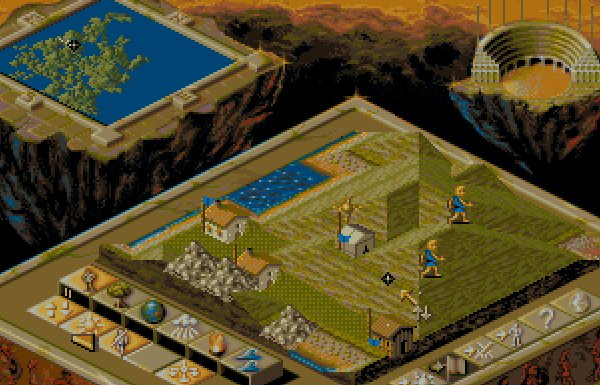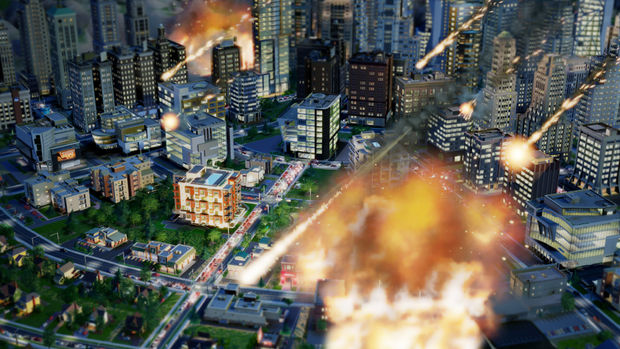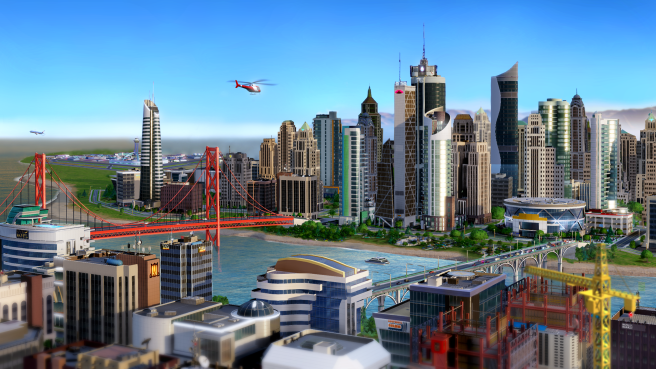Who doesn’t like SimCity? Well, other than that one guy you knew who didn’t think creating a city and managing its growth could fascinate the human mind in any way. in that sense, Sim City’s a giant mechanical sandbox. Build a residential area and watch it grow; build a factory and cause pollution. Sim City, at heart, shows the player cause and effect within a set of programmed systems. I would call it the presentation of an urban ecosystem, but that would sound rather pretentious, I imagine, even if wholly true.
That’s always been part of the appeal of the so-called “God games” that erupted out of the late 1980s and early 1990s. Characterized by a bird’s eye view of events happening below, you become more a celestial manager of the mortal than a god of any kind. You need to manage things, and make sure events happen that cause a positive, rather than a negative result. Some of them, like Peter Molyneux and Bullfrog’s (RIP) Populous, give the player specific objectives – in that case, destroying the followers of other gods by leading your people to victory.

All of the Sim games from Maxis (and now, from Electronic Arts/EA) tended to eschew that objectives and goal-oriented hierarchy. Rather, they’d rather give you the shovel and the playthings, then leave you in the backyard to experiment. For one, that appears a LOT of trust in the player’s abilities – even the “moral branching choice” trend of today requires massive amounts of planning. From a design perspective, none of those various choices emerge naturally; someone needs to program all that stuff, or even determine the end result of said actions down the line in a complicated tree. Will Wright says “no” to all of that; the systems at work sustain themselves. Play around with it and see what happens to a rather complex and complete set of systems when tiny changes are introduced.
That makes it pretty uninteresting as a game in the long term, but more interesting as a little distraction to mess around. I suppose you could call Dwarf Fortress its modern successor (which, somehow, usurped Sim City’s introduction into MOMA) which does the same exact thing with different presuppositions. Sim City perfected self-sustained simulation of the growth of a city in real (or sped up – hey, we’re an impatient bunch) time. You get to build for a while, then keep building, and then keep building. You manage more and more complex systems and try to balance everything so X person or Y neighborhood isn’t mad at Z pollution and/or traffic.
The problem, then, lies in the lack of a resolution to all of this building. It simply continues forever and ever without end. While there’s something to be said for it as an intellectual exercise, it rarely holds its worth beyond those initial few days. Who wasn’t enamored with it? Even the Super NES version seemed a marvel at the time, but there’s a definite end-point when the played becomes bored. There’s only so much playing without guidance – hence games being defined as “structured play” even in the most general sense.

And by default, that would mean I don’t think Sim City much of a game. Even the scenarios included in the original don’t let you build, which means they may as well be different games altogether. So what do I mean, then, by Sim City lacking “game-like” qualities? Think of the production of any human civilization in the arts. They tend to reflect the life, thoughts, and experiences of people from a particular context. Most of all, they reflect, at the least, a particular perception of reality. When you look at Medieval art (drawn or sculpted), you see much of the infamous “Hellmouth” – Hell was thought as a real and present danger, as much as the demons that terrorized people daily. That environment produced art that reflected that worldview. Our current generation’s postmodernism makes everything into art; then, we see so much diversity that it is hard to produce a solid definition for the purpose of discussion (to admit my own maddening frustrations with this would seem a given, I imagine).
We might, furthermore, say that those mediums resonate in their context precisely for that reason. Imagery of hell, demons, tortures, Christ returning to smite the evildoers, etc., existed for that purpose. People inject their feelings and their thoughts into art; the best kind reverberates through the generations, but that does not diminish the impact of works created in their own time. They created things which they believed, and saw true beginnings and true ends. Life had definitive purpose and meaning; in a phrase, they weren’t reliant on the society of consumption as the sole end of the human psyche.

As they created art that works for them, so we create “art” that works for us – except we don’t seem to know what we want. We want a world without boundaries and limits; we want to continually produce things, do things, experiment and mix without fear of consequence. Unfortunately, we live in the realm of the unreal and the illusion, of constant accumulation of “stuff”. In many ways this reflects itself in many video game genres – from the JRPG kleptomaniac to the Mega Man weapon hoarder to the World of WarCraft player who really, really needs that Cloud Serpent mount (definitely not talking about myself). I, myself, feel prone to the endless collect-a-thon, the accumulation of things both virtual and physically present. But all production ends somewhere – things come to an end. People die; storms bring down great cities. That remains the cycle of life, whether in Ecclesiastes or in Baudrillard. God is both a God of Wrath and a God of Love, while still being a God of Love (1 John 4:8). God and life aren’t reducible to a magic principle, but one detects a pattern even in one’s own life of production and eventual destruction, good and evil. For the Christian, we observe a moment of sanctification versus the dark night of the soul. I don’t purport to explain it, but merely to point it out.
It is that inevitably turn, then, that Sim City fails to employ – hence why it fails to engage. Games that don’t reflect the rules of reality in some way never resonate. A game, for all intents and purposes, has clearly defined rules and structure – even supposed “games with no rules”, which simply mask said rules through some creative gestures or good press. A game designer knows that their risk/reward structure must fit adequately with the innate kinesthetics of the game itself. I hate to use the word “game feel”, but that ambiguity describes the core mechanics – do they engender a sense of satisfaction, short term or long term? Either works as long as the developer understands their own game. Without tension or strife or struggle, there’s no depth or meaning to the game. Empowerment comes from mastering and avoiding failure. A zen-like state is reached when you recognize everything perfectly and win. Empowerment does not come from a game feeding you false confidence, inflating your pride or your ego; it comes from complete and utter mastery of the game’s mechanics, through and through.
There’s nothing to “master” in Sim City. There’s nothing to learn. It is a simulation of a simulation – a creation of reality based on our perceived reality, rather than what truly lies beyond. That does not mean, for the first few days of utter fascination, you will not enjoy it (or its natural disaster function, which probably isn’t in the new “interconnected” Sim City – that would stop the production, don’t you know!). I know I did; it is wonderful, and quite a flight of fancy. But like all entertainment, it must reflect our vision of the world or it will not work in the long term. Man’s vision of God necessarily contains these cracks; our “God-games” will never measure up because they carry those tendencies of rebellion. We still keep the Bible close to our hearts, but we can only know what a human can know. As Isaiah 55 says:
6 Seek the Lord while He may be found;
Call upon Him while He is near.
7 Let the wicked forsake his way
And the unrighteous man his thoughts;
And let him return to the Lord,
And He will have compassion on him,
And to our God,
For He will abundantly pardon.
8 “For My thoughts are not your thoughts,
Nor are your ways My ways,” declares the Lord.
9 “For as the heavens are higher than the earth,
So are My ways higher than your ways
And My thoughts than your thoughts.
Framing our thoughts in this direction surely aids us in understanding life…if not also video games.

